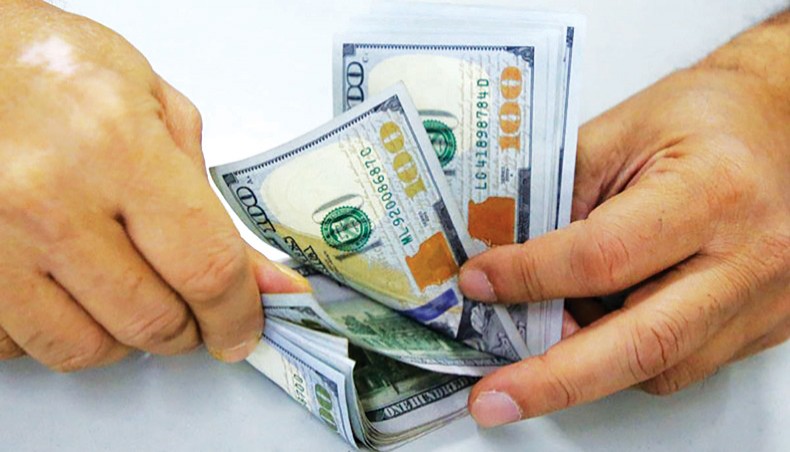
A file photo shows a man counting US dollar notes at a currency exchange house in the capital Dhaka. The volume of foreign currencies held by the country’s commercial banks hit a four-month low in May as dollar crisis worsened amid a decline in remittance and exports earnings. — New Age photo
The volume of foreign currencies held by the country’s commercial banks hit a four-month low in May as dollar crisis worsened amid a decline in remittance and exports earnings.
In addition, the ongoing US rate hike is exacerbating the dollar shortage as it reduced foreign direct investment and caused capital outflows, bankers said.
The gross foreign currency balance with the banks plunged to $5,120 million in May from $5,497 million in in the previous month.
The figure in May represented the lowest volume of forex holdings by the banks since January when it stood at $4,849 million.
According to Bangladesh Bank data, the forex holdings by the banks had increased steadily for six consecutive months until April.
The gross holding was $5,497 million in April, $5,343 million in March, $5,240 million in February, $4,849 million in January, $4,708 million in December, $4,708 million in November, and $4,505 million in October.
The inward remittance declined marginally to $19.41 billion in July-May of the financial year of 2022-23 compared with that of $19.2 billion in the same period in the past year.
Bangladesh’s export earnings in the July-May period of the current financial year 2022-23 reached $50.52 billion, showing a slight growth of 7.11-per cent compared with that of $47.17 billion in the same period of FY 2021-22.
The current dollar shortage has already forced the government to secure $4.7 billion in loans from the International Monetary Fund over a period of three years.
Since April 2022, the government and the Bangladesh Bank have taken a series of initiatives to restraint surge in imports.
The Bangladesh Bank imposed restrictions on the import of luxury items and unnecessary products to curb high demand for dollars, bankers said.
As a result of such measures, import payments for the period of July-May in FY2023 decreased by 14.4 per cent to $58.78 billion compared with those of $68.66 billion in the same period in the financial year 2021-22, according to the BB data.
Moreover, the BB is continuously selling dollars to the banks, which has also contributed to improving the dollar shortage on the market.
The BB sold around $13 billion to banks in July to May in FY23 while in the whole year of 2021-22 it had injected $7.62 billion into the financial market.
The dollar sales have unintended consequence of reducing the foreign reserve of the BB, while also mopping up local currency, which created another problem — a liquidity crisis in the banking sector.
Bankers said that commercial banks continued to face difficulties meeting import payment obligations as the country’s dollar crisis has been persisting for more than a year.
Only a small number of banks hold a significant portion of the dollar reserves in Bangladesh, with many other banks experiencing a deficit in their dollar reserves.
Businesses, therefore, face difficulties in accessing foreign currencies for importing necessary inputs or making international payments, which impact their day-to-day operations and the overall economic activities, industry insiders said.
The foreign currency reserve in Bangladesh dropped to $29.8 billion on May 31 as the Bangladesh Bank increased dollar sales to tackle the greenback crisis on the market.
The limited availability of dollars has caused the value of local currency taka to fluctuate.
The exchange rate rose sharply to Tk 108 from Tk 84.8 against the US dollar within a year. The BB approved floating rate of dollars on September 14, 2022.
Source: The Daily New Age

